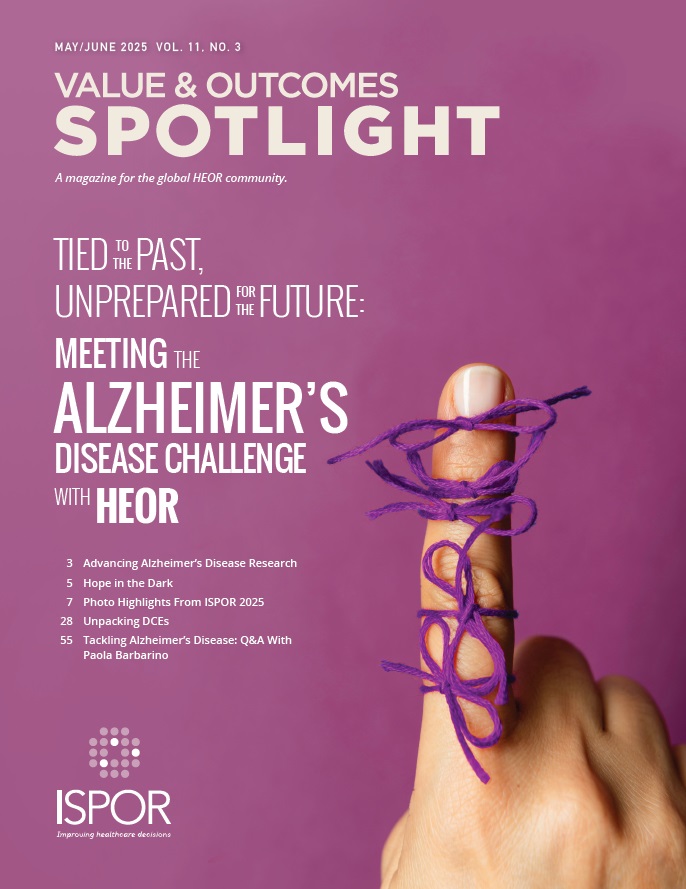Advancing Alzheimer’s Disease Research Through Health Outcomes and Real-World Evidence
 Alzheimer’s disease (AD), a progressive neurodegenerative condition, is increasingly recognized as one of the paramount global health challenges. Affecting over 55 million people worldwide, with projections estimating 152 million cases by 2050, AD demands urgent attention not merely for its medical implications but for the extensive societal ripple effects it provokes. As the incidence of AD rises unabated, the conundrum of how best to integrate health outcomes research with real-world evidence (RWE) emerges as a critical frontier in the ongoing quest to mitigate the impact of this formidable disease.
Alzheimer’s disease (AD), a progressive neurodegenerative condition, is increasingly recognized as one of the paramount global health challenges. Affecting over 55 million people worldwide, with projections estimating 152 million cases by 2050, AD demands urgent attention not merely for its medical implications but for the extensive societal ripple effects it provokes. As the incidence of AD rises unabated, the conundrum of how best to integrate health outcomes research with real-world evidence (RWE) emerges as a critical frontier in the ongoing quest to mitigate the impact of this formidable disease.
Central to this discourse is the intrinsic value of health economics and outcomes research in elucidating the economic undulations wrought by AD. Annually, dementia costs surpass $1.3 trillion globally, encompassing medical treatments, nursing home care, and informal caregiving provided at significant personal sacrifice. This financial burden is exacerbated by the silent epidemic of undiagnosed cases, particularly in low- and middle-income countries, where stigma and limited healthcare resources hinder timely diagnosis and access to support systems. It is estimated that only 25% of dementia cases are correctly diagnosed, leaving millions without adequate care and grooming systemic inequities across health landscapes.
"Alzheimer’s disease demands urgent attention not merely for its medical implications but for the extensive societal ripple effects it provokes."
The growing pipeline of over 100 potential AD treatments in advanced clinical trials offers hope. The latest therapeutic advancements, marked by the advent of monoclonal antibodies such as lecanemab and donanemab, offer promise by potentially altering the disease trajectory. These drugs aim to decelerate cognitive deterioration by targeting and ameliorating amyloid plaques—a hallmark of AD pathology. Yet, while promising, their efficacy, accessibility, and economic viability remain points of contention among healthcare professionals and policy makers. Concerns about their cost-effectiveness juxtapose the financial promise they hold in potentially reducing the overall societal costs of managing AD.
RWE is instrumental in bridging gaps between clinical trial data and actual patient outcomes. Unlike controlled clinical environments, RWE reflects the nuanced impacts of Alzheimer’s treatments in diverse healthcare settings, capturing variations in disease progression and response to interventions. Such evidence is vital for informed policy decisions and for optimizing the allocation of healthcare resources. Models like the GUIDE program, which aims to streamline dementia care in the community, emphasize the utility of RWE in driving policies that enhance quality of life for patients, and alleviate the burdens on caregivers.
The engagement of caregivers—often the unsung heroes in navigating AD—is crucial in this ecosystem. Caregivers shoulder immense emotional and financial burdens, often at the expense of their personal and professional lives. They render invaluable services through unpaid care, illuminating the urgent need for systemic reforms that integrate caregiver support into health policy frameworks. Technological interventions—such as virtual reality tools for early detection—promise to bolster these support systems, easing caregiver burdens and improving outcomes for patients.
Despite these burgeoning innovations, significant gaps remain in the care ecosystem. In the United States, 20 states are classified as “dementia neurology deserts” due to shortages of geriatric specialists and diagnostic facilities. Globally, up to 90% of dementia cases in low-income countries go undiagnosed, reflecting disparities in access to care. Addressing these challenges requires coordinated efforts to expand diagnostic capacity, improve care coordination, and support caregivers. Innovative models, such as Japan’s Orange Plan and South Korea’s “war on dementia,” demonstrate how government-led strategies can drive systemic change.
"Alzheimer’s disease poses a multifaceted threat exacerbated by societal and economic factors, demanding a concerted global response."
AD research faces precarious crossroads. Funding fluctuations and budget cuts threaten to stall research progress at a pivotal moment. The National Institutes of Health envisages a stark shortfall in meeting the mandates of the National Plan to Address Alzheimer’s Disease, jeopardizing the momentum of breakthroughs critically needed to curb this escalating crisis. Moreover, proposed reductions in diversity, equity, and inclusion research funding could severely impact women’s health studies—a vital consideration given that women comprise nearly two-thirds of the AD patient demographic.
AD poses a multifaceted threat exacerbated by societal and economic factors, demanding a concerted global response. Advancements in therapy, ongoing research initiatives, and a robust integration of RWE into health policies constitute promising avenues toward addressing AD more effectively. Ensuring equitable access to care, empowering caregivers, and steadfastly pursuing research funding are imperative as nations strive to accommodate the mounting demands of an aging global population. As we stand at the cusp of transformative breakthroughs, the collective commitment to harnessing RWE offers hope for a more balanced and sustainable approach to battling AD. The time to act is now—AD demands urgent attention, innovation, and systemic change.
As always, I welcome input from our readers. Please feel free to email me at zeba.m.khan@hotmail.com.
Zeba M. Khan, RPh, PhD, Editor-in-Chief, Value & Outcomes Spotlight

